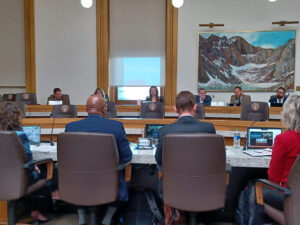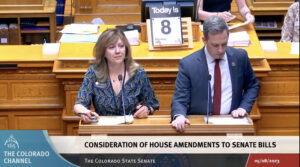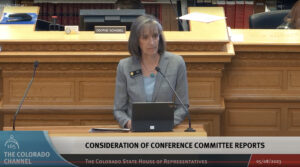At the end of a legislative session uniquely focused on utility companies and their operations, legislators and the state’s two investor-owned utilities may have hit the sweet spot on a pair of bills that will impact how they calculate rates and ensure the safety of their gas pipelines.
Gov. Jared Polis on Thursday signed Senate Bill 291, a measure aimed at slowing future utility rate hikes through limitations on costs that can be included in the rates. And over the coming weeks, he will decide the fate of House Bill 1216, which passed on the final day of the session Monday and adds new requirements on pipeline inspections.
The special attention on utilities this session stemmed from natural-gas costs that rose 75% over the winter and were passed along to customers who struggled to pay bills in some cases. The citizen outrage over those costs led legislative leaders to create a Joint Select Committee on Rising Utility Rates that examined structural ways to reduce volatility in those rates.
Reining in utilities’ rates
SB 291 was like an omnibus bill of the major ideas discussed over three hearings of the select committee. As introduced, it sought to ban incentives given for extension of gas pipelines to new developments, require the Public Utilities Commission to study how utilities could share some of the cost of natural-gas spikes rather than pass them all along, mandate another study on how to move utilities away from natural-gas infrastructure and bar cost recovery through rate hikes for certain administrative expenses.
Leaders of Xcel Energy Colorado and Black Hills Energy warned that rather than having the effect of cutting costs, the bill could do the opposite, as its requirements for companies to eat some of the natural-gas price hikes could reduce credit ratings and increase the cost of future infrastructure upgrades. Senate President Steve Fenberg, the Boulder Democrat who chaired the select committee and co-sponsored SB 291, argued that such talk was overblown rhetoric by utilities that have a state-blessed monopoly on operations, but he worked with the companies to make two significant changes.

The Joint Select Committee on Rising Utility Rates questions a panel of leaders from Xcel Energy and Black Hills Energy during a March 14 hearing.
One change was to allow the PUC, as it considered whether utilities should share risk in natural-gas price hikes, to consider as well whether such changes could hurt a utility’s credit rating and take that into account in any rulings it made, said Hollie Velasquez Horvath, Xcel regional vice president of state affairs and community relations. Further amendments to the bill grant utilities the ability to not have to eat some of the increased gas costs but to spread and recover them over a period up to five years in length, which would reduce volatility in customers’ bills.
The other major change was to a study the bill mandates to see whether the extension of gas pipelines to new developments is putting a disproportionate burden on customers with fixed incomes – a study that could have resulted in new fees to new communities to build such lines. Rather than have the PUC do an investigative study with a direction to consider such new fees, the bill now orders the Colorado Energy Office to examine potential costs of electrification rather than gas service for new communities, without language suggesting costs of new development could be hurting others, Horvath noted.
Both sides happy with the compromise
Sponsoring Democratic Reps. Chris deGruy Kennedy of Lakewood and Matthew Martinez of Monte Vista also allowed the addition of an amendment late in the bill’s progress that gives utilities until the end of 2024, rather than 2023, to finish installing gas-line extensions funded with the 28% discount that the bill bans after this year.
Particularly with the allowance for spreading gas-price increases across a multi-year period, Horvath said she believes the bill now can accomplish the committee’s original goal to find ways to slow increases in utility rates.
“We had the ability to talk with all the key stakeholders and the legislators about what they wanted,” she said, sounding a decidedly more conciliatory and upbeat tone than utility leaders expressed during much of the committee meetings and early bill testimony. “Ultimately at the end of the day, we landed in a good place with this.”
Democratic legislators behind the bill also celebrated its merits after Gov. Jared Polis inked SB 291 into law at Namaste Solar headquarters in Boulder.
Rebalancing the equation at PUC
By banning utilities’ cost recovery of expenses such as lobbying and advertising in rate hikes and allowing the PUC to limit their cost recovery for attorneys testifying for the need for rate hikes, the law “rebalances the relationship between ratepayers and utility companies,” deGruy Kennedy said in a news release. And by giving the PUC more guardrails more ability to consider the kinds of energy service they offer while the state pushes for greater grid electrification, the law can create long-term cost savings too, Fenberg said.

Colorado state Sens. Lisa Cutter and Steve Fenberg discuss their bill on utility rates with the Senate.
“One thing quickly became clear: Coloradans are bearing the brunt of volatile rate increases while utility companies are empowered to set their own rules,” co-sponsoring Sen. Lisa Cutter, D-Morrison, said. “This important legislation will help level the playing field at the PUC and create fairer processes in utility rate-setting that will impact Coloradans today and for generations to come.”
Utilities also got a win on a lower-profile bill that leaders said could help to keep down rates.
Utilities’ gas pipeline inspections
House Bill 1216, sponsored by Rep. Tammy Story, D-Evergreen sought originally to require utilities and other natural-gas pipeline operators to inspect gas meters and service regulators at least every three years, which is two years more often than required under federal rules. Colorado’s 34,000 square miles of distributed natural-gas pipeline are aging and ripe for accidents, and the state needs to require inspections more often for public safety, she said.
Xcel and Black Hills leaders warned, however, that they would need to increase staffing levels to maintain a triennial inspection schedule, and that increase would filter down to rate hikes at a time when state officials have said the rates are too high already. Working with the Senate, officials amended the bill to require inspections no more than every three to five years, in accordance with federal Pipeline and Hazardous Materials Safety Administration rules, so that they did not have to inspect every line in the state two times in the period when the federal government required one checkup, Horvath said.
After agreeing to the change, sponsoring Sen. Jessie Danielson, D-Wheat Ridge, told the Senate on May 1 that she had “narrowed the bill a bit” but still had “a really good step forward on improving the safety of natural-gas pipelines.”
“Put lives at risk”

Colorado state Rep. Tammy Story criticizes changes made to her bill on pipeline safety.
Story, however, couldn’t have disagreed more. She took the bill to a conference committee to shorten the inspection timeline again, and when that was unsuccessful, she tore into utility companies on the House floor during the final day of the session Monday, saying the changes will ensure the state is no safer when it comes to the pipelines.
“The policy work on HB 1216 has not been about collaboration,” Story said in a speech that brought the otherwise raucous House chamber to silence. “It is all about power, and that will continue to allow the industry to put lives at risk.”
Polis has not said yet whether he will sign HB 1216, but he also has given no indication that it is on the short list of bills he is considering for a veto.
